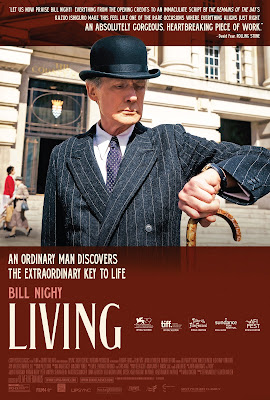I first encountered Bill Nighy back in 2003, playing the ageing rocker in that Christmas-time classic, Love Actually. There—sardonically flogging his new and clunky Yuletide version of a rock classic--- he was profane and outrageous . . . and absolutely hilarious. Since I had never consciously seen Nighy on screen before, it was easy to assume that the role reflected his basic personality type. Obviously, he was an iconoclast. Nothing changed when I learned he had played the comically grotesque Davy Jones in two Pirates of the Caribbean films.
My opinion started to shift in 2011 when Nighy was part of the ensemble in another gathering of Britain’s finest thespians, The Best Exotic Marigold Hotel. Now he had transformed into the meek husband of a shrill harridan (Penelope Wilton). By the end of the film, their marriage has blown skyhigh, and he’s making a romantic connection with lovable widow Judi Dench. As I recall, our last glimpse of the duo is aboard a motorbike, zipping joyously through the streets of Jaipur.
But none of the above had prepared me for Nighy’s hauntingly emotional star turn in a small 2022 film that has earned him a Best Actor Oscar nomination. Living is based on a 1952 film by the great Akira Kurosawa. Although Kurosawa’s reputation mostly rests on costume dramas like Yojimbo and Seven Samurai, Ikiru (starring Takashi Shimura) is set in what was then present-day Tokyo. The Japanese title translates as “to live,” and is inspired by Kurosawa’s reflections on his own future mortality. It’s the story of a hard-working bureaucrat who—discovering that he’s dying of cancer—struggles to cope with the time he has left. A deeply self-contained man, he experiments with hedonism, but finally finds meaning in using his work to contribute in a small way to the common good. This is a positive message, but it’s balanced by an ending that’s quietly sardonic.
I’m fascinated by the shift of the story from Tokyo to London, as accomplished by screenwriter Kazuo Ishiguro, the perfect man for the job. A novelist, screenwriter, and 2017 Nobel laureate, Ishiguro was born in Japan but moved with his parents to England at the age of six. His best-known literary works, like Remains of the Day and Never Let Me Go, are set in the United Kingdom, and feature fully English characters. Still, his family connection to the land of his birth gives him a helpful dual perspective on the British Isles. Ishiguro brings an acute cultural sensitivity to Living, a story that plays on the similarities and differences of British and Japanese culture.
Those who’ve studied Japan know that the Japanese have long felt a cultural identification with England. Both Japan and England are island nations with an ancient tendency toward class distinctions, social decorum, and stiff-upper-lip response to the challenges of life. Notably, this new English version of Kurosawa’s film is also set circa 1952, rather than in our present day. My guess is that today’s London—much more multicultural and rambunctious than in the post-World War II period—would not suit this story. The London of Living is a place of bowler hats and strict codes of behavior. But it’s also a place of unwieldy bureaucracy and a general indifference to the unfortunates who look to government officials for help with their daily lives. (In this it certainly seems modern as well as dated.)
Nighy’s tender, deeply-felt performance will long stay with me, as will some of the film’s smaller roles. Now I’d like to go back and watch Kurosawa’s Ikiru again.


No comments:
Post a Comment